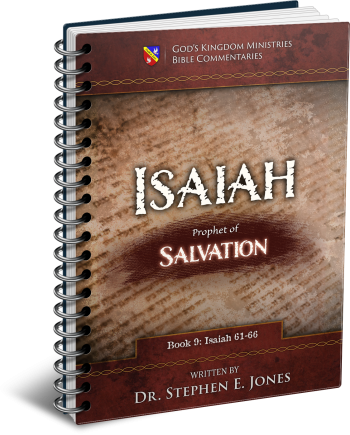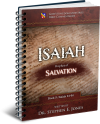Latest Posts
View the latest posts in an easy-to-read list format, with filtering options.

Isaiah is the prophet of Salvation. He is also known as the truly "Universalist" prophet, by which is meant that He makes it clear that salvation is extended equally to all nations and not just to Israel. He lived to see the fall of Israel and the deportation of the Israelites to Assyria, and he prophesied of their "return" to God (through repentance). He is truly a "major prophet" whose prophecies greatly influenced the Apostle Paul in the New Testament.
Category - Bible Commentaries

Isaiah 65:9 distinguishes between the “chosen ones” and the people of Judah as a whole. Verse 10 gives a blessing upon those who are chosen. Then Isaiah 65:11 tells us how He will treat the non-chosen people who broke their Old Covenant vow and worshiped false gods.
11 “But you who forsake the Lord, who forget My holy mountain, who set a table for Fortune [Gad], and who fill cups with mixed wine for Destiny [Meni, “to divide, allot, number, count”]…”
“Fortune” (NASB) is rendered “that troop” in the KJV. The Hebrew word is Gad, the well-known Syrian god of fate, or good luck. Recall that Gad was also the name of one of Jacob’s sons.
Gen. 30:11 says,
11 Then Leah said, “How fortunate!” So she named him Gad.
The word gad comes from gud, “to invade with troops.” Hence, when Jacob prophesied over his sons, he said of Gad in Gen. 49:19,
19 As for Gad, raiders shall raid him, but he will raid at their heels.
The Babylonians and Syrians had called their god of fate by this name. They identified Gad with Jupiter and Meni with Venus, although some today believe that Meni was the sun or perhaps the moon. Meni is the same as the god Manu, found in the Assyrian inscriptions. The Arabs identify Gad as the greater good fortune and Meni as the lesser good fortune, who was said to number (or allot) each man his fate.
Worshipers laid out tables of food for these gods, particularly a cup of wine mixed with honey. So the prophet speaks of those “who fill cups with mixed wine.” Such worshipers are condemned in Isaiah 65:12,
12 “I will destine [mana] you for the sword, and all of you will bow down to the slaughter. Because I called, but you did not answer, I spoke, but you did not hear, and you did evil in My sight and chose that in which I did not delight.”
Mana, “to destine,” is the root word of Meni, “Destiny.” In other words, the people of Judah were destined “for the sword.” Because they worshiped Fate, their fate was to be slaughtered by the sword. The god of fate could not grant them good luck or good fortune, because the law of the Creator rules the universe and has the power to overrule any good luck that false gods might appear to grant them.
Isaiah 65:13, 14 says,
13 Therefore, thus says the Lord God, “Behold, My servants will eat, but you will be hungry. Behold, My servants will drink, but you will be thirsty. Behold, My servants will rejoice, but you will be put to shame. 14 Behold, My servants will shout joyfully with a glad heart, but you will cry out with a heavy heart, and you will wail with a broken spirit.”
Once again, we see how God distinguishes between “My servants” and “you”—that is, those who fail to serve Him. Those who had refused to obey the God of Israel were not part of the same company as “My servant whom I have chosen” (Isaiah 43:10). Neither were idolaters “My witnesses,” for they did not bear witness on earth to the divine witness in heaven.
The Messiah was the Witness who was called “My servant, whom I uphold, My chosen one in whom My soul delights” (Isaiah 42:1). This calling extended only to those who follow the Messiah and are part of His body. Those who reject the chosen Messiah and remain blind are not God’s chosen people but are those destined for judgment, as Isaiah affirms.
Even so, we must be reminded that such judgment is temporary because it is remedial and because the law of Jubilee limits all judgment. The future age of judgment is not “aeternas,” but olam and aionian, that is, “age-lasting.”
Isaiah 65:15 continues,
15 “You will leave [nuah, “rest, settle down, set down”] your name for a curse to My chosen ones, and the Lord God will slay you. But My servants will be called by another name.”
It is often said today that God will bless those who bless the Jews and curse those who curse the Jews. This teaching is based on a misunderstanding of Gen. 12:3, where God told Abraham,
3 And I will bless those who bless you, and the one who curses you I will curse, and in you all the families of the earth will be blessed.
The real question is how to bless Abraham. What does it mean to curse Abraham? In short, those who bless Abraham are those who share his New Covenant faith. These are the children of Abraham (Gal. 3:7). Those who lack Abraham’s faith are those who curse him, for not only do they disagree with Him, they also reject the One that Abraham foresaw and rejoiced in seeing (John 8:56).
Those who contradict Abraham also curse him—usually without realizing it. Hence, the idea that God’s blessing or curse depends upon one’s attitude toward unbelieving Jews is unbiblical. Gen. 12:3 should be understood to mean that anyone who curses Abraham and his children will be under a curse. Those who bless Abraham and his children will receive God’s blessing.
The Hebrew concept of a “son” was more than just genealogical. There were children of light, children of the devil, children of wisdom, and children of Abraham—and none of these were references to literal, biological children. Jesus Himself defined Abraham’s children in John 8:39, saying, “If you are Abraham’s children, do the deeds of Abraham.”
It is the resemblance in word or deed that defines father and son. Hence, though Jesus said, “I know that you are Abraham’s descendants” (John 8:37), He said also, “You are of your father the devil” (John 8:44). Was Jesus, then, cursed by God for speaking ill of Jews?
We must rid ourselves of the idea that God’s chosen ones are those who may claim physical descent from Abraham. Isaiah says plainly that the unbelieving Jews in his day would leave their name for a curse to God’s chosen ones. Conversely, the chosen ones were to be “called by another name” to distinguish them from these unbelievers. This, I believe, was fulfilled in Acts 11:26, “and the disciples were first called Christians in Antioch.”
The disciples and all other genuine believers were the real “Jews,” according to Paul in Rom. 2:29. Their status in the tribe of Judah was not based upon their physical descent from Abraham but upon the manner of their circumcision. He who claimed status as a member of the tribe of Judah on the basis of fleshly circumcision was “not a Jew” (Rom. 2:28). Paul continues, saying, “he is a Jew who is one inwardly,” that is, one having heart circumcision.
That is God’s definition of a Jew. Hence, “his praise [Judah means “praise”] is not from men, but from God.” In other words, while men apply the name “Jew” (i.e., Judah) to those with fleshly circumcision, God recognizes Christ’s disciples as being “Jews.” From God’s perspective, one must have heart circumcision in order to be worthy to be called by the name, “Judah.”
Yet because men continued to refer to the unbelievers as “Jews,” Isaiah prophesies that their name (“Jew”) was to be settled or established, not as a term of praise to God, but “for a curse to My chosen ones.” This was seen clearly in the early church, which was persecuted by these children of flesh, even as Ishmael persecuted Isaac (Gal. 4:29). In his early days as a spiritual Ishmaelite, Paul himself had persecuted the church (Gal. 1:13; 1 Tim. 1:13).
The bottom line is that those who persecute the true “Jews” are the ones cursing Abraham and his children. It is not the other way around, although I must add that the church in history has often mistreated the Jews in violation of the law of God. We do not condone such attitudes and behavior, for this too is contrary to the love of God.
Isaiah 65:16 says,
16 “Because he who is blessed in the earth will be blessed by the God of truth [Amen]; and he who swears [allegiance] in the earth will swear by the God of truth [Amen]; because the former troubles are forgotten, and because they are hidden from My sight!”
We must link this verse to the one previous in order to get the full sense of what the prophet is saying. God’s servants will be called by another name, because he who is blessed (i.e., God’s servants) will be blessed by the God of Amen. God’s servants are those who have been blessed by Abraham, who was called to bless all families of the earth. Such people will swear allegiance to the God of Amen, being themselves an Amen people.
In other words, they will be in agreement with God and with His Son, Jesus Christ, who has been given the title of “The Amen” in Rev. 3:14,
14 To the angel of the church in Laodicea, write: “The Amen, the faithful and true Witness, the Beginning of the creation of God, says this:”
Jesus did only what He saw His Father do and said only what He heard His Father say. He was always in agreement with His Father, and thus He was worthy of the title: “The Amen.” He was the faithful Witness in that He was faithful to speak what He had heard. He was a true Witness, because all that He spoke was a precise repetition of what the Father spoke. By the principle of the double witness, where heaven and earth bore witness to the creative word of God, heaven came down to earth in a great marriage.
Those who, in turn, bear witness to that which the Son has spoken are part of His body. They too bear witness of heaven on earth and thus become part of the creative process. This is “the Beginning of the creation of God.” Just as the first creation came into being when the Father spoke and the Son bore witness, so also the new creation is coming into being as the earth bears witness to the Christ, who is The Amen.
Isaiah says that when these witnesses are given this new name, “Christians,” i.e., little christs, then “the former troubles are forgotten,” as we read in Rev. 21:4,
4 and He will wipe away every tear from their eyes; and there will no longer be any death; there will no longer be any mourning, or crying, or pain; the first things have passed away.
In essence, the chosen ones, God's servants, were to be called by the name of their Head, Jesus Christ, who was also given the name, “The Amen.” In other words, those who are blessed through Abraham are called The Amen People.
This leads us to Isaiah’s comments about the new heavens, the new earth, and the new Jerusalem, which John reveals in greater detail in Revelation 21 and 22.